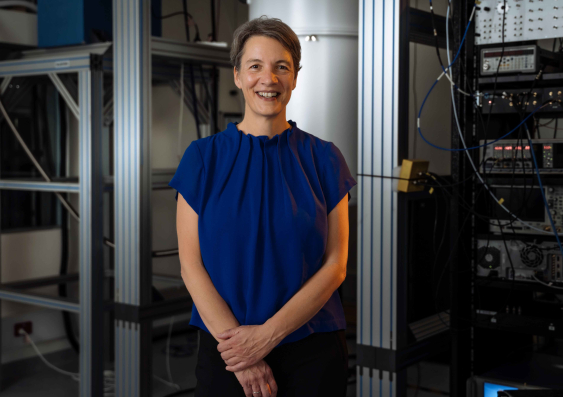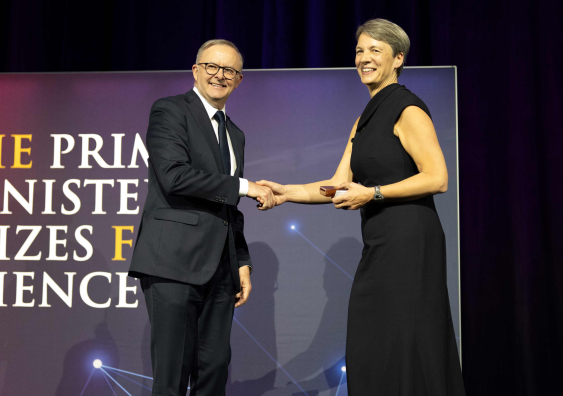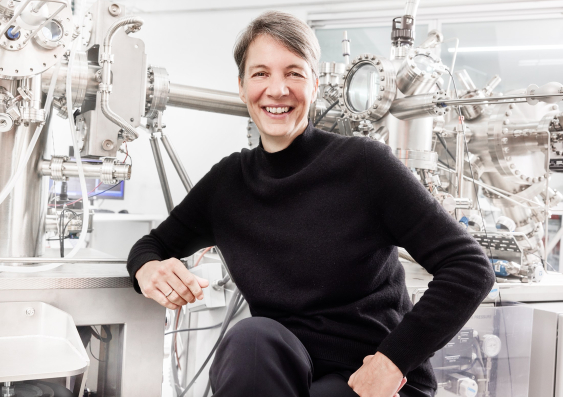Atomic electronics pioneer awarded Prime Minister's Prize for Science
For the second time in two years, a UNSW academic has been honoured with the prestigious Prime Minister’s Prize for Science.
For the second time in two years, a UNSW academic has been honoured with the prestigious Prime Minister’s Prize for Science.

Olga Gerloff
UNSW Corporate Communications
0434 498 838
o.gerloff@unsw.edu.au
UNSW Sydney Scientia Professor Michelle Simmons has been named the winner of the annual 2023 Prime Minister’s Prize for Science for her achievements in creating the field of atomic electronics, with a mission to create the world’s first error-corrected quantum computer here in Australia.
Prof. Simmons is the Director of the Australian Research Council (ARC) Centre of Excellence for Quantum Computation and Communication Technology at UNSW and the Founder and Chief Executive Officer of UNSW start-up Silicon Quantum Computing (SQC), Australia’s first quantum computing company.
Prof. Simmons is an ARC Laureate Fellow and former 2018 Australian of the Year. She is also a Fellow of the Royal Society of London, the American Academy of Arts and Science, the American Association of the Advancement of Science, the UK Institute of Physics, the American Physical Society, the Australian Academy of Technology and Engineering, and the Australian Academy of Science.
Her discoveries have the potential to impact almost every industry that is dependent on data, such as revolutionising therapeutic drug design, optimising route planning for delivery or logistical systems thereby reducing fuel costs and delivery times, and creating better fertilisers for agriculture.
“I’m over the moon to receive the Prime Minister’s Prize for Science. Yet figuring out how to make electronic devices with atomic precision is not something I could ever have done on my own. For 25 years, I have worked with many amazing scientists and engineers – and I am enormously grateful to all of them,” Prof. Simmons said.
“I would add a particular thank you to my current team. They are the most exceptionally talented group I have ever worked with. I can’t imagine a better group of people or a more likely team to deliver an error-corrected quantum computer for the benefit of Australia and the world.”
The Prime Minister’s Prizes for Science are Australia’s most prestigious awards for outstanding achievements in scientific research, research-based innovation and excellence in science teaching. UNSW Scientia Professor Trevor McDougall was last year’s winner of the Prime Minister’s Prize for Science for significant advancement of knowledge through science and research.
Associate Professor Brett Hallam from UNSW Engineering received the 2022 Prize for New Innovators, and Professor Alison Todd and Dr Elisa Mokany from UNSW Science were joint winners of the Prime Minister’s Prize for Innovation.

Michelle Simmons received the 2023 Prime Minister’s Prize for Science from the Prime Minister, Anthony Albanese. Photo: Department of Industry, Science and Resources.
UNSW Vice-Chancellor and President Professor Attila Brungs congratulated Prof. Simmons on this outstanding achievement.
“Michelle is internationally renowned for creating the field of atomic electronics, pioneering new technologies to build computing devices in silicon at the atomic scale,” he said.
“She is one of a handful of researchers in Australia to have twice received an Australian Research Council Federation Fellowship. She is a global superstar and I applaud her achievements in receiving the 2023 Prime Minister’s Prize for pioneering this important field.”
UNSW Dean of Science, Scientia Professor Sven Rogge, said this was a significant achievement in the field of science.
“I’m immensely proud of our quantum computing researchers at UNSW, and Michelle is the extraordinary leader of this incredible team,” Prof. Rogge said.
“Her discoveries are now being commercialised as the basis for a new generation of quantum computing. Congratulations to Michelle on being awarded the Prime Minister’s Prize for Science, it’s a well-deserved recognition.”

Michelle Simmons is pictured with one of Silicon Quantum Computing’s scanning tunnelling microscopes which enables the atomically precise manufacture of SQC’s silicon-based quantum processors. Atomic precision is critical to unlock the global potential of quantum computing. Photo: SQC
Alongside her team, Prof. Simmons has pioneered unique technologies internationally to build electronic devices in silicon at the atomic scale, including the world's smallest transistor, the narrowest conducting wires, 3D atomic electronics and the fastest two qubit gate in silicon.
“There are at least 60 different algorithms for quantum computing with numerous applications already identified, from drug design, improving the energy density of batteries to making nitrogen fertilisers more cost effectively and friendlier to the environment. I’m certain there are more applications not yet imagined,” she said.
Prof. Simmons’ work focuses on adapting a scanning tunnelling microscope to not only image atoms, but to manipulate them to create new devices at the atomic scale. Her research has pioneered new technologies to realise the world’s first single atom transistor and then advance it to an integrated circuit where all components were made with atomic precision.
“There’s an extraordinary array of functional elements in a quantum processor. With atomic precision placement of just two types of atoms in our devices, phosphorus and silicon, we have proven that we can optimise the speed and quality of qubits, essential for realising an error corrected quantum computer,” Prof. Simmons said
Her discoveries are now being commercialised as the basis for a new generation of quantum computing, a discipline which uses principles of quantum physics and is predicted to solve extremely complex problems in minutes that would otherwise take thousands of years.
In 2017, Prof. Simmons founded Australia’s first quantum computing company, Silicon Quantum Computing, a UNSW start-up, which is the only company in the world that manufactures with atomic precision.
“Through the Centre of Excellence, and now our start-up company SQC, our research has been incredibly well supported by the University for two over decades. I am very grateful to UNSW and our shareholders, who have helped nurture the growth of fundamental research through to an Australian-born company in unique partnership with government and our industry partners, the Commonwealth Bank of Australia and Telstra,” she said.
“Our team is always pushing the edge of what’s possible. As scientists and engineers, we get a daily shot of adrenalin to work in this space. As CEO it is very rewarding to lead a high-performing team in a uniquely Australian work context that is both collaborative and egalitarian.”
Prof. Simmons’ next mission is to create the world’s first error-corrected quantum computer here in Australia, working with homegrown talent, including local physicists, engineers, and computer scientists.
“For more than 25 years, Australia has been training engineers in quantum technologies, whether it's physicists, engineers, or computer scientists. And they all reside in Australia. Our talent to make the world’s first quantum computer is already here,” Prof. Simmons said.
Read more about the annual The Prime Minister’s Prizes for Science.